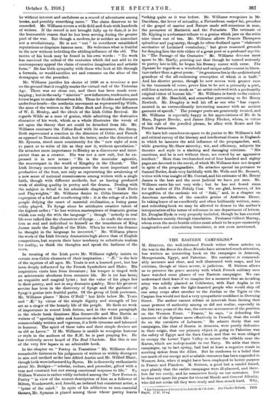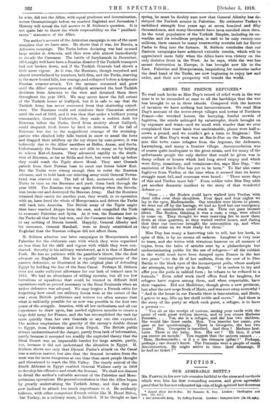THE EASTERN CAMPAIGNS.*
M. gTIENON, the well-informed French writer whose articles on the war in the Revue des Deux Mondes have attracted much attention, has written an interesting book on the campaigns in Armenia, Mesopotamia, Egypt, and Palestine. His narrative is commend- ably accurate and clear, and well illustrated with maps, and his criticism, though at times severe, is judicious. M. Stienon allows us to perceive the grave anxiety with which French military men have watched some phases of our Eastern campaigns. We can understand their fears if we imagine for a moment that an invading army was solidly planted at Colchester, with East Anglia in its grip. In such a cam the light-hearted people who would ship off one army corps after another to the Jordan or the Tigris or the Caspian Sea would not find a very sympathetic confidant in Downing Street. The author cannot refrain at intervals from hinting that some persons of authority among us did not realize, especially in the first two years of the war, the extreme seriousness of the position on the Western Front. "France," he says, "is defending the iaterests of the Syrians more effectively in Picardy than she could do on the outskirts of Lebanon." He admits freely that our campaigns, like that of Russia in Armenia, were purely defensive in their origin, that our primary object in going to Palestine was the safety of Egypt and the Suez Canal, and that we were obliged to occupy the Lower Tigris Valley to secure the oilfields near tho Kartm, which are indispensable to our Navy. He adds that these campaigns, up to last spring, had had at least a negative result in averting defeat from the Allies. But he confesses to a belief that too much of our energy and available resources has been expended in Western Asia, when it might have been employed to better purpose in France and Flanders. M. Stienon, a good but a candid friend, says plainly that the earlier campaigns were ill-planned, and there- fore far too costly, and he comments freely on our mistakes. Yet he does not spare his praise for General Maude and General Allenby, who did not strike till they were ready and then struck hard. Why, • Lee camPednee d'Orient et lee Interits de l'Enksate. Par Mules Stien011. l'arLS Payot, [7 fr.. 50 cj
he asks, did not the Allies, with equal prudence and determination, secure Constantinople before we reached Baghdad and Jerusalem ? History will reveal the full answer to M. Stienon's question. It is not quite fair to throw the whole responsibility on the " pusillani- mous " statesmen of the Allies.
The author's account of the Armenian campaign is one of the most complete that we have seen. He shows that it was, for Russia, a defensive campaign. The Turks before declaring war had Massed large armies in Armenia, and thus were able almost immediately to invade the Caucasus. The battle of Sarykamish in December, 1914,might well have been a Russian disaster if the Turkish transport had not broken down, and if the Turkish Generals had shown a little more vigour. As it was, the Russians, though surprised and almost overwhelmed by numbers, held firm, and the Turks, starving in the snow-bound hills, lost eourage,and collapsed before a desperate Russian counter-attack. Yet the menace remained and grew until the Allies' operations at Gallipoli attracted the best Turkish divisions from Armenia to the west and detained them there throughout the year 1915. We may never know the full extent of the Turkish losses at Gallipoli, but it is safe to say that the Turkish Army has never recovered from that shattering' experi- ence. The Russians could not reinforce their Caucasian armies until the end of 1915, and it was than that under a brilliant young commander, General Yudenitch, they made a sudden dash for Erzerum before the Turks, freed from anxiety about Gallipoli, could despatch fresh forces by land to Armenia. If the fall of Erzerum was due to the magnificent courage of the storming- parties who climbed lofty hills buried in snow to assail the forts and dragged their artillery up the icy slopes by man-power, it was indirectly due to the Allies' sacrifices at Hellas, Anzac, and Suvla. Unfortunately the Russians were not able to repay us by helping to relieve Kut-el-Amara. They advanced rapidly to the douth- west of Erzerum, as far as Bitlis and Sort, but were held up before they could reach the Tigris above Mosul. They sent Cossaok patrols from their Persian base to meet our forces below lint. But the Turks were strong enough then to resist the Russian advance, and to hold back our relieving army until General Towns- hend was starved out. The fall of /int, moreover, enabled the Turks to turn on the Russians and push them back through the year 1916. The Russian tide was again flowing when the Revolu- tion broke out and destroyed the Russian Army. Had the Russians retained their sanity for another year, they would, in co-operation with us, have freed the whole of Mesopotamia- and driven the Turks well back into Anatolia. The British army of the Tigris might then have reached Aleppo from the east, and compelled the Turk. to evacuate Palestine and Syria,. As it was, the Russians lost to the Turks all that they had won, and the Caucasus into the bargain, to say nothing of Russia herself. Happily, General Allenby and his successor, General Marshall, were so firmly established at. Baghdad that the Russian collapse did not affect them.
M. Stienon admires our later campaigns in Mesopotamia and Palestine for the elaborate care with which they were organized no less than for the skill and vigour with which they were con- ducted. Security is his military watchword, as it is that of Marshal Foch. He has no patience with the gambler's throw, like the first' advance on Baghdad. But he is equally contemptuous of the passive defensive, as illustrated in the original plan of defending Egypt by holding the line of the Suez Canal. Perhaps M. StiOnon does not make sufficient allowance for our lack of trained men in 1915. We had an abundance of willing recruits, but all too few battalions or squadrons that could be trusted in difficult field operations such as proved necessary in the Sinai Peninsula when an active defensive was adopted. We may forgive a French critic for forgetting how small our military forces were at the outset of the war ; even British politicians and writers too often assume that what is militarily possible for us now was possible in the first two years of the struggle. America, with all her enthusiasm and all our experience to draw upon, has needed eighteen months to create a large field army for France, and she has accomplished the task far more quickly than her own Generals or any one else expected. The author emphasizes the gravity of the enemy's double threat. to Egypt, from Palestine and from Tripoli. The British public always underestimated the danger, partly from lack-of information, partly because it accepted too readily the exploded theory that the Sinai Desert was an iinpassable barrier for large armies, partly, too, because it did not understand the situation in Egypt. M. Stienon shows not only that Djemal Pasha's attaek on the Canal was a serious matter, but also that the Senw3si invasion from the west was far more dangerous at one time than most people thought and threatened to reach the Nile Valley. The timely arrival of the South Africans in Egypt enabled General Wallace early in 1916 to develop his offensive and crush the Senussi. We shall not discuss in detail the author's valuable account of the Palestine and Meso- potamian operations. His general conolueion is that the Allies began by greatly undervaluing the Turkish Army, and that they are now inclined to attach too much importance to it. He evidently believes, with other competent French critics like M. Henri Bidou, 'hat Turkey, in a military sense, is finished. If he thought so last
spring, he must be doubly sure now that General Allenby has de- stroyed the Turkish armies in Palestine. He estimates Turkey's mobilized strength four years ago at seven hundred and fifty thousand men, and many thousands have been enrolled since then. As the total population of the Turkish Empire, including its un- warlike and its rebellious peoples, is said to be only twenty-one- millions, there cannot be many trustworthy recruits left for Buyer Pasha to fling into the furnace. M. Stienon concludes that our Eastern campaigns have achieved valuable results, which will be appreciated more fully when the Allies have won victory on the only decisive front in the West. As he says, while the war has meant destruction in Europe, it has brought new life to the East. Palestine and Mesopotamia, languishing for centuries under the dead hand of the Turks, are now beginning to enjoy law and order, and their new prosperity will benefit the world.



































 Previous page
Previous page